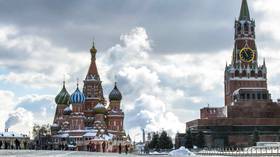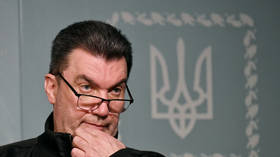
Reports that a Russian presidential aide has talked to EU on freezing the conflict is not true, Moscow says

FILE PHOTO. People walk in front of St. Basil’s Cathedral and the Kremlin on Red Square in Moscow on March 16, 2018. © Mladen ANTONOV / AFP
The allegation that Russia has been secretly negotiating an end to the Ukraine conflict along the lines of how the Korean War ended is false, Kremlin spokesman Dmitry Peskov stated on Monday.
The Russian official described as a “hoax” last week’s reports in Ukraine that Dmitry Kozak, the deputy head of Russia’s presidential administration, was involved in a clandestine diplomatic mission to resolve the Ukrainian conflict.
Aleksey Danilov, the head of Ukraine’s national security council, claimed during a TV interview last week that Kozak “got into action” and was holding meetings with European officials “to force us to sign” a peace deal. He stated that Russia wanted to partition his country the way the Korean Peninsula was split in 1953, after its three-year-long devastating armed conflict. Kiev will not accept any such deal, Danilov declared.
Peskov suggested that whatever contacts between Kozak and EU officials Danilov was referring to may have involved a different person by the same surname, possibly a Ukrainian MP.
Taras Kozak is a Ukrainian politician elected to the country’s parliament in 2019 and attached to the faction of the Opposition Party – For Life bloc. The party has come under repeated attacks by the government of President Vladimir Zelensky for supposedly having a pro-Russia agenda, but its members have insisted they are victims of political persecution.

Read more
In early 2021, the Ukrainian security council imposed personal sanctions against Kozak and the head of the party, Viktor Medvedchuk. In May of the same year, both were charged with state treason for allegedly handing over Ukrainian secrets to Russia.
Kozak reportedly fled the country shortly afterwards. Medvedchuk was put under house arrest, reportedly went on the run last year, but got captured and was later included in a prisoner swap with Russia. Kiev seized the assets owned by both men.
Russia sent troops into Ukraine on February 24, 2022, citing Kiev’s failure to implement the Minsk agreements, designed to give Donetsk and Lugansk special status within the Ukrainian state. The protocols, brokered by Germany and France, were first signed in 2014. Former Ukrainian president Pyotr Poroshenko has since admitted that Kiev’s main goal was to use the ceasefire to buy time and “create powerful armed forces.”
Shortly before the hostilities broke out, the Kremlin recognized the Donbass republics as independent states and demanded that Ukraine officially declare itself a neutral country that will never join any Western military bloc. Last September, Donetsk and Lugansk, as well as Kherson and Zaporozhye Regions, were incorporated into Russia following referendums.




